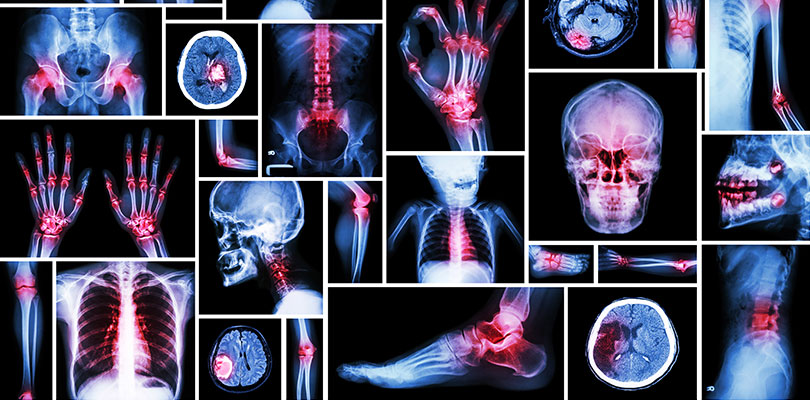Photo Credit: minoandriani / iStockPhoto.com
A Look at Celiac and Wheat Allergies
Gluten-free diets have become popular in current times but is there any benefit if you don’t have celiac disease or wheat allergy?
It is estimated that one to two percent of the population has celiac disease, an autoimmune disease. In celiac disease, gluten (a protein present in wheat, rye, oats and barley) triggers the immune system to start attacking the small intestine. If left undiagnosed, the disease can cause significant damage to the intestines.
This damage can impair digestion of foods and absorption of nutrients, which can lead to nutritional deficiencies, and can cause osteoporosis, infertility and depression, among others. Constant inflammation of the intestines also increases the risk of certain bowel cancers.
For people with celiac disease, damage to the intestines can happen even when only a small amount of gluten is present in the diet. Symptoms may include bloating, flatulence, diarrhea, constipation, nausea, vomiting, stomach cramps, weight loss, weakness, fatigue and anemia.
However, damage can occur without obvious symptoms.
Management requires correct diagnosis and then completely avoiding gluten in the diet. Unfortunately, celiac disease can be hard to diagnose and it is estimated that up to 80 percent of celiac cases remain undiagnosed.
The symptoms mimic many other conditions. Blood tests may suggest the disease but are not always accurate and can give falsely negative results. The disease can only be confirmed by laboratory analysis of biopsies taken from the small intestine under sedation.
However, these results are only valid if the patient has been eating a high gluten diet prior to testing.
Similarly, a small percentage of people have an allergy to wheat. In these people the body’s immune system overreacts to gluten or non-gluten proteins in wheat, invoking an allergic response.
Eating wheat products can cause intestinal symptoms, like cramps, bloating and diarrhea. Breathing in wheat pollen can lead to asthma, skin contact can cause a skin rash, and some people may even experience a serious anaphylactic reaction. An allergic reaction will typically occur within hours of contact with wheat.
So, it is important that people with celiac disease and wheat allergy avoid gluten. But what about the rest of the population?
Is Gluten-Free Right for You?
Some scientists have proposed a non-celiac gluten sensitivity (NCGS) may exist. This is following the observation that some people with intestinal symptoms who have been excluded for celiac disease and wheat allergy improve on a gluten-free diet.
In a percentage of these people, celiac disease may not have been adequately excluded. Surveys have demonstrated poor testing practices by many medical practitioners; however, misdiagnosed celiac disease does not explain all cases.
It may be that a certain number of people who go gluten-free improve because some other ingredients in grains are also coincidentally excluded. This has been demonstrated in some people who have irritable bowel syndrome (IBS).
Have you thought of getting genetic testing done? Find more information on where to start, the benefits, what it involves, and the risks of genetic testing.
IBS sufferers have increased sensitivity to distension of the intestines by gas or feces. Studies have shown people with IBS benefit from a low-FODMAP diet.
FODMAP — or fermentable oligosaccharides, disaccharides, monosaccharides and polyols — are small carbohydrates and substances in the diet that pass through the intestines without being taken into the body and increase gas production.
Gluten-free diets are often coincidently low in FODMAPs and can improve IBS symptoms, but a gluten-free diet is actually unnecessary.
Does NCGS Really Exist?
Nevertheless, evidence is mounting that non-celiac gluten sensitivity may exist, although some researchers do question that it does. The problem is that NCGS has only been described more formally as a possible condition since 2010.
Thus, as yet there are limited studies on NCGS and the mechanism by which gluten might cause a non-celiac, non-allergic disease. In suspected NCGS cases, patients do not have any of the typical blood or intestinal changes seen in celiac disease and wheat allergy.
There is also currently no laboratory test to confirm NCGS. Thus, it must be diagnosed by excluding celiac disease and wheat allergy and demonstrating symptoms specific to gluten. Although some theories exist as to the mechanisms of NCGS, research is still in its very early stages.
Current evidence indicates NCGS symptoms may occur days or hours after eating gluten products. The reaction may not be just to gluten but also to other proteins also present in gluten-containing grains.
Symptoms are similar to IBS, such as abdominal pain, bloating, flatulence, diarrhea and constipation. However, some people may also experience headaches, fatigue, joint and muscle pain, trouble concentrating, leg or arm tingling, skin rash and depression.
There have also been suggestions that NCGS may be associated with schizophrenia, autism spectrum disorders, and attention deficit disorders, and that psychological symptoms in some improve on a gluten-free diet. To date, most people self-diagnose NCGS and start a gluten-free diet without any medical tests or advice.
Should You Go Gluten-Free?
So should you go gluten-free? If you have no symptoms of intestinal disease or other general symptoms, there is no evidence a gluten-free diet is of any benefit.
Gluten is present in many foods, so going gluten-free will involve significant adjustments and some inconveniences. Celiac disease, IBS, inflammatory bowel disease, lactose intolerance, and many other conditions share similar symptoms to potential NCGS.
The consequences and management of these conditions can be different. Before embarking on a gluten-free diet, it is better to seek medical advice and have celiac disease and other conditions excluded adequately because diet can affect results.
If celiac disease and other conditions have been excluded, try a full elimination diet; excluding gluten, dairy, soy, eggs, fruit, beef, chicken, etc. You might want to see a nutritionist to help you with this.
If symptoms improve, reintroduce gluten into the diet to see if your symptoms re-emerge. If they do, take away the gluten until symptoms disappear again. Reintroduce other gluten-free foods.
If you remain symptom-free on a purely gluten-free diet, only then can you be sure you have a gluten sensitivity.







